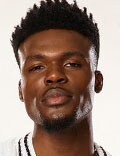You’ve heard of students using mnemonics to recall key lessons. But creating original melodies to study medical terms with vocal chops that have been recognized nationwide?

Andrew Igbokidi
Andrew Igbokidi, a first-year medical student who made it last season to the final rounds of The Voice, continues to use his singing talents for his medical education. With the new season of the televised singing contest in battle rounds this week, we revisit the 22-year-old’s rise from new med student to stardom as he prepares to release his first cover single. It’s based on Billie Eilish’s “When the Party’s Over,” which he performed during the show’s “blind auditions.”

Andrew Igbokidi
To recap: Before he even cracked his textbooks at the University of Arkansas for Medical Sciences last year, Igbokidi received a “four-chair turn” from the celebrity judges in Los Angeles, who signaled after only hearing him ― not seeing him. They all wanted Igbokidi on their team. He spent the next few months balancing med school and TV show commitments.
After the final knockout round, he again turned his focus primarily to his studies. He shares with Medscape Medical News what he learned from the experience that might help contestants this season.
This interview has been edited for length and clarity.
Medscape: What advice do you have for those competing this season?
Igbokidi: Honestly, the one thing that I can say is try not to let all of the pressure of being on the show, the overwhelming amount of things that you will have to do besides the actual singing, affect your performance. Really just try to focus on singing the way you know you can and take in the moment.
Medscape: What were some of the highlights from your time on the show?
Igbokidi: I guess first and foremost it would be working with Charlie Puth and Camila [Cabello]…. That day my battle partner and I were the last to rehearse, so because of that, we got to spend like an hour rehearsing and talking with them, which no one else got. That was such an out-of-body, super cool experience. And then probably just the friends I made. There were three people, in particular, that are best friends now.
Medscape: You come from a family of medical professionals. Your mom is a cardiologist. Your two sisters are studying to be nurses, and you were a certified nursing assistant (CNA) in a hospital.
Igbokidi: I was in my second year of college, and like for everyone else, many opportunities were canceled, because the pandemic was really, really intense at the time. And so I had lost pretty much every single opportunity that I would have to further my academic situation during the summer. And so I took a test and got certified and started working as a nursing assistant. And I worked there for about 2 years, and it was really interesting.
I think CNAs are like ground-level workers, like we’re doing every single thing that the nurses and the doctors simply don’t want to do. But at the same time, it is really hard work. And so it gave me an appreciation for that interaction and dynamic with the patient. But it also gave me insight to the dynamics between nurses and doctors and PTs [physical therapists].
Medscape: So why did you want to be a doctor?
Igbokidi: I don’t know that I ever was set on becoming a nurse. But I think, always in the back of my mind, I thought about being a physician. I have a pretty good academic track record. So it wasn’t that I didn’t think I could do it in terms of grades-wise, but it did feel, in terms of lifestyle, work balance, it would be a lot less aggressive and rigorous.
Because I’ve seen my mom’s schedule throughout the years. I don’t know if I want to spend my entire life not being able to do the things that I want to do when I want to do it. But I realized that there are so many opportunities as a physician to choose certain specialties and certain lifestyles that allow you to do what you love as well, inside and outside of your work life.
Medscape: You were able to attend many classes virtually. How else did you juggle the show and medical school? Did you have any conflicts balancing the two commitments, and how are you faring in school now?
Igbokidi: So I actually just days before my knockout performance had a complication with my school where I almost was not able to perform. It was super intense, and I have no clue how that might have affected my situation, but I ended up being able to perform. Essentially my school was needing me to be in Arkansas, and The Voice was needing me to be in LA. It was really interesting for me because even though I was stressed and very tense, these are two amazing opportunities, and I had to maintain that understanding and compartmentalize.
In a more direct way, I also just had to manage my time efficiently, so I would come back from rehearsals or vocal lessons and then try to get as much work done as possible. I’ve always been super type A, and I’m very much a perfectionist, so it was a little bit difficult having to let go the reins slightly in order to be able to give myself to both things. But with all things considered, I think it’s going pretty good.
Medscape: You sang on your father’s cruise ship, but you’ve said your parents were not musical. What is your musical background? Do you play instruments? Did you take music lessons?
Igbokidi: I’m trying to learn the ukulele. I’m also trying to learn how to play piano. I’ve always sang and done choir, but I never got into hard-core taking lessons to play an instrument, which I regret, so I’m gonna fix that now.
I never took formal vocal lessons. Growing up, my sister and I used to write songs. It was super influential in terms of my introduction to music, because from a young age I was writing and actually showing interest in it. I was like 14, and I sang for one of my friends in high school. And she was like, “You’re like actually good.” I would sit in my room listening to all the greats, like Stevie Wonder singing riffs and runs, and just try to copy their mechanisms of singing their styles, and that’s honestly how I strengthened my voice.
Medscape: You use music to learn your medical school lessons?
Igbokidi: It didn’t have to be specific words and lyrics. To remember things, I would just sing a melody, a certain tune, and that would be attached to a certain term or to like a certain pathway or mechanism. And then I would be able to think of that melody or those notes, and it would remind me of certain substates or certain pathways. That was sort of like this crossing of paths between my musical side of my brain and my educational side.
Medscape: Do you have a specialty in mind? Do you want to be a cardiologist like your mom?
Igbokidi: Orthopedic surgery is something that I can wrap my mind around. And I’m really interested in, like, bones. Neurology and neurosurgery I thought about as well, but the residency and the rigor, it would take a lot of commitment.
Cardiology is something also that I might do, interventional cardiology. My mom’s really influenced me in that way. And she’s like: “Oh, I really want us to be able to practice together.” That’s a sweet thought that makes me, like, go get it. Maybe I should do it.
Medscape: Did you think at some point you could win The Voice, and how did that change at the finals?
Igbokidi: [I started] to believe when like Camila would tell me that and other people in the show told me I am like a frontrunner because I never saw it as that…because I was going to med school. I think a lot of these people, they’re musicians, only musicians. And so when they leave The Voice, it feels like the end of the world. But I knew that I was going back to class the next morning. So I didn’t have enough time to be remorseful or not remorseful, to be grieving it or to like feel sad about it because I had to quickly start studying. But at the same time, there was a period where, after like the first exam, I finally realized, oh well, I’m not on the show anymore.
And I didn’t feel super confident about my performance, so I knew that I wasn’t going to live playoffs. I almost wasn’t able to perform actually the knockout performance because of school obligations, and so I had to tell The Voice executives, and so there’s no telling how things might have affected my outcome in terms of that whole situation. And it’s just something I don’t really want to dwell on. I’d rather be happy and satisfied with the fact that I made it that far. And that I got to meet all those people and sort of just be proud of myself for making it as far as I did.
Medscape: You didn’t win the competition, but do you still have a chance at a record deal?
Igbokidi: All of the artists sign an agreement at the beginning of the process with Republic Records. The person who wins the show is guaranteed a record deal. However, the other artists can be selected at the time of the season’s closing, so right now no one knows. I’m writing and recording right now, and I’m figuring out management. It’s been super time consuming with medical school, but I think I’m finding a healthy balance.
Medscape: What advice would you give future medical students who look up to you as a role model?
Igbokidi: I think some advice would be to be ambitious and think in a forward fashion, but do not dwell on the end goal too intensely.
I think you should be able to develop a drive and passion for medicine or whatever you want to accomplish, but if you begin to obsess over and think about achieving that goal in an extreme way, it can many times prove to be more detrimental to your overall mental health and drive than beneficial.
Medscape: What takeaways do you have from being on The Voice?
Igbokidi: I have gained so much from my experience on The Voice. I gained just so much general confidence in myself and my abilities when it comes to who I am as a singer, an artist, honestly, just as a person. I think singing on national television is something that takes a lot of courage to do. I left The Voice with a feeling that if I could do what I did on The Voice, a lot of other things that I will encounter in life maybe aren’t that scary.
Roni Robbins is an editor/writer for Medscape Business of Medicine. She’s been published in WebMD, HuffPost, Forbes, NY Daily News, BioPharma Dive, MNN, Adweek, Healthline, and others. She’s also the author of Hands of Gold: One Man’s Quest to Find the Silver Lining in Misfortune, www.ronirobbins.com.
For more news, follow Medscape on Facebook, Twitter, Instagram, and YouTube.
Source: Read Full Article
